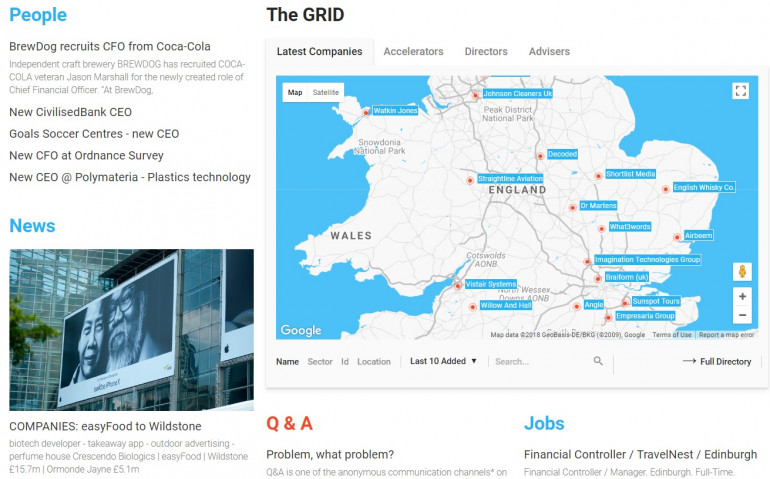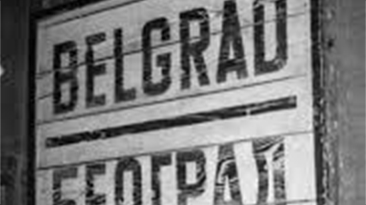Published by Directorzone Markets Ltd on February 22, 2016, 9:00 am in News, Other
Wednesday January 1st 2020
News about 10 UK growth companies and/or accelerators (turnover in brackets) in the GRID marketplace, 14th – 20th February 2016:
Jessops (£70.4m) | Oxford Nanopore Technologies (£0) | Focal Point Positioning | Olio | Nimber | Circle Property | Movebubble | CitySprint (£146m) | Chargepoint (£8.3m) | BrewDog (£45m)
JESSOPS: sales surge under Peter Jones | Oliver Shah, Sunday Times. 14 February, 2016
DZ profile: Jessops Europe Limited
Business: Retail camera chain
Launched: 1935
Founder: Frank Jessop founded Jessop of Leicester as a specialist photographic retailer..
Staff: Dragons’ Den star Peter Jones, 49, chairman - made most of his estimated £475m fortune in mobile phones.
Financials: Sales rose from £57.9m to £70.4m during the year. Jessops swung from a pre-tax loss of £2.1m to a profit of £112,900.
Investment: Jones bought the Jessops’ brand name after it collapsed into administration in 2013, with the closure of all its shops. Jones had been expected to relaunch Jessops as an online-only operation. However, he opened 50 stores and rehired 350 staff.
News: Jessops has enjoyed a 20% jump in sales after being saved from extinction. Jones said a greater proportion of the market was now made up of more expensive products designed for photography enthusiasts and that with far fewer camera specialist retailers to serve this market, the opportunity for each store is higher than before. He added that training staff to be experts would help to ward off the threat from internet rivals.
UPDATE:
TV Dragon Peter Jones sees red at Jessops | The Sunday Times. January 7, 2018
1. ... fell to a loss last year after costs spiked. A pre-tax profit of £124,000 in 2016 tumbled to a loss of £765,000 before tax in the year to April 30.Accounts filed at Companies House also show that the company received £2.2m of loans from other parts of Jones’s business empire. Revenue was up almost a quarter to £99.9m, but new store openings, increased staffing costs and setting up a new subsidiary tipped it into the red.
2. Today there are 58 Jessops outlets across the country.
OXFORD NANOPORE TECHNOLOGIES: Genome pioneer aims for £1bn float | Peter Evans, Sunday Times.
DZ profile: Oxford Nanopore Technologies Limited
Business: has developed a gene-sequencing — or DNA-on-a-chip — device the size of a memory stick, called the MinION. The $1,000 Minion, is the size of a mobile phone and connects to the USB socket of a portable computer. Since its launch last year, Minion has been popular with scientists using it to read the genomes of pathogens in the field, including Ebola in Africa.
The technology has caused excitement because of its potential in helping identify targets for new medicines. Has pioneered the development of portable and inexpensive gene-reading machines. It aims to challenge the market leader, Illumina, and other DNA sequencing companies, which produce more powerful but much larger and more expensive kits.
An even smaller DNA sequencer, called SmidgIon and scheduled for launch late next year, will connect directly to a mobile phone. It could be used by patients at home to carry out DNA tests and send their results to doctors. Dr Sanghera said the company’s goal was to make possible “the analysis of any living thing, by anyone, anywhere”.
Launched: 2005
Location: Oxford
Founder: Gordon Sanghera, the co-founder and chief executive,
Financials: The most recent annual accounts showed a loss before tax of £41.7m. It did not make any revenue.
Investment: Was spun out of Oxford University 11 years ago. Since its launch has attracted £251m of funding. IP GROUP said last year that its 20% stake was worth £193m. Other shareholders include LANSDOWNE PARTNERS, ODEY ASSET MANAGEMENT and WOODFORD INVESTMENT MANAGEMENT.
UPDATE:
UK biotech group raises £100m to sell DNA-reading tools in Asia | Clive Cookson, FT. December 13 2016
1. Oxford Nanopore, one of Britain’s fastest growing private technology companies, has raised £100m in new funding to extend its range of portable DNA reading machines. The private share placement brings the total raised so far to £351m. The funding round is led by GT HEALTHCARE, an investment partnership based in Hong Kong and focusing on Asia, which is a new investor in Oxford Nanopore. The quoted IP Group committed a further £14m to Oxford Nanopore in this round. It will have a stake of 19.7 per cent worth £246.3m, which implies a total value for Oxford Nanopore of £1.25bn.
2. Gordon Sanghera: his aim is to build an independent UK technology group. An IPO is not on the agenda in the short term, he told the FT, but he hopes that Oxford Nanopore will eventually be listed on the London market.
Biotech unicorn promises profits | Sabah Meddings, The Sunday Times. October 8 2017
3. Oxford Nanopore … expects to turn a profit within three years …valued at £1.2bn, is among a swathe of British innovators which, while loss-making, are tipped to become titans in future. Their sky-high valuations often pay no heed to revenue or financial results, instead focusing on the value of their scientific assets. Oxford Nanopore lost £59.1m on revenue of £4.5m last year, … its chief executive, Gordon Sanghera … predicts a sales lift of 300%, with revenues set to hit $24m (£18.4m) by the end of the year. Market leader, Illumina, is worth $30bn (£22.9bn).
4. Gordon Sanghera … over a few beers at the King’s Arms next to Wadham College … secured the first investment in Oxford Nanopore. Dave Norwood, the co-founder of science innovation company IP Group, had agreed to plough £500,000 into the start-up. Twelve years later, Oxford Nanopore is considered to be one of Britain’s rare “unicorns” — an unlisted technology company valued at more than $1bn.
5. Its flagship DNA-sequencer, the MinION, has already been used to track the ebola virus across West Africa, and research zika in South America. A London hospital recently used it to pinpoint how a deadly infection had reached its intensive care ward. Soon, the equipment will be in every home, hospital and research laboratory across the world, according to Sanghera, the company’s chief executive.
6. this notion of “cheap and easy genetics” which Sanghera hopes can catapult the company towards “global domination”. … Illumina, the market leader, is valued at $30bn (£23bn) and has become an essential tool for researchers, hospitals and clinics. However, Illumina sequences vast swathes of DNA at once and can take many hours. Oxford Nanopore’s hand-held device reads out long strands and can provide answers to simple diagnostic question in real time. Its devices can read codes of DNA in minutes, threatening to disrupt an industry which is skyrocketing.
7. Oxford Nanopore’s existing devices … are aimed at researchers. However, Sanghera will soon go after consumers. The SmidgION, which will plug into a smartphone, is to be launched next year.
8. A Shanghai office will follow shortly — the latest in its overseas expansion. It already has offices in New York and Boston, and staff in Japan and France.
9. Sanghera’s resolve has been further tested by a string of patent disputes in America. In April last year, a US court found against Oxford Nanopore in a case brought by Illumina. The parties reached a settlement — details of which were not made public at the time. Oxford Nanopore has now revealed it made no payment and is allowing others to draw their own conclusions. More recently, Pacific Biosciences took a punt — alleging the company infringed two of its sequencing-related patents. Sanghera is unfazed.
FOCAL POINT POSITIONING: University spin-outs demand a better deal | Kiki Loizou and Peter Evans, Sunday Times.
DZ profile:
Business: develops specialist navigation systems for smartphones and the defence industry
ICB Classification: 9537 Software
Location: Cambridge
Founder: Ramsey Faragher
Investment: investment from venture capital firm PASSION CAPITAL and also from CAMBRIDGE ENTERPRISE. Ramsey wanted the university’s investment group on board, despite feeling so strongly about keeping hold of his intellectual property.
News: Faragher, a senior research associate at Cambridge’s computer laboratory, resigned his post the moment he thought up plans for his company, fearing he would have had to hand over his intellectual property. “The problem is you don’t have a say over how it is used or to whom it is licensed, so you might end up sitting back and watching as it gets shelved,” said Faragher.
Would you like to tuck into my leftovers? The sharing economy | Kiki Loizou, Sunday Times.
OLIO
DZ profile:
Business: Olio lets neighbours, cafes and shops share unwanted food. So far, 25,000 users have signed up to give away surplus goods or pick up something for dinner. The app is free, though the founders are working on how to make money through transaction fees.
ICB Classification: 5377 Specialized Consumer Services
Launched: 2015
Location: Finsbury Park, north London
Founder: Tessa Cook, 39, chief executive and Saasha Celestial-One, 39, chief operating officer
Staff: 7 people
Investment: raised about £1m from private investors in the autumn to expand outside the capital.
News: “British households throw away food worth £12.5bn a year,” said Cook. “It’s like walking out of a shop with five bags and leaving one in the car park. Environmentally, it’s screwed up.”
NIMBER
DZ profile:
Business: community delivery service that connects people who need items transported with others who are travelling to the desired destination. has 26,000 users signed up in Britain and more than 30,000 in Norway, where it started.
ICB Classification: 5377 Specialized Consumer Services
Launched: 2013
Location: Old Street, east London
Founder: Ari Kestin, 41, the chief executive
Staff: 13 people
Financials: Investment: has raised more than £2m from angel investors and it hopes to secure funds for expansion soon.
CIRCLE PROPERTY: makes £42m debut on London's junior market | Kasmira Jefford, City A.M. 16 February
DZ profile:
Business: regional property company which owns 16 commercial properties across the country valued at £73.9m. Since 2006, the group's portfolio has been held by Circle Property Unit Trust (CPUT), a closed-ended, unlisted unit trust.
ICB Classification: 8633 Real Estate Holding & Development
Launched: 2002
Founder: founded by a group of family investors and also counts banking heir Jamie Hambro and the Duke of Roxburghe as non-executive directors,
Staff: John Arnold, chief executive. Chaired by former Land Securities boss Ian Henderson
News: has listed on AIM, London's junior market, with a market value of £42m. The company has raised around £1.2m in additional proceeds. It aims to grow its portfolio by snapping up well located but under managed regional properties before refurbishing them and letting them at higher prices.
MOVEBUBBLE: Rental app wins £1.1m funding from investors including former Spotify boss | Kasmira Jefford, City A.M. 17 February
DZ profile:
Business: app for renters looking for a home in London - lists thousands of properties available whilst also helping renters to book and manage viewings. The app allows people to give feedback on properties and offers guides on different neighbourhoods, such where to dine out or what to visit. It also crucially claims to offer real-time availability of the properties listed through the app to save people from visiting a property only to find out by the time they contact the landlord or estate agent that it has already been let.
ICB Classification: 8637 Real Estate Services
Launched: November 2015
Location: London
Founder: Aidan Rushby, former estate agent
Investment: the latest funding takes total investment in the business to date to £2.36m and will be used to build the in-house team. The investors included Spotify's former managing director Adam Williams and the founder of asset management firm London and Capital Richard Leigh among others.
News: has won £1.1m backing from a group of investors including the former boss of Spotfify.
CITYSPRINT: Lloyds Banking Group's private equity arm buy stake in same-day delivery firm | City A.M. 18 February
DZ profile:
Business: is the biggest player in the £1.7bn same-day delivery market and operates the UK’s largest privately owned network, with over 3,000 couriers and 40 service centres. It claims to reach 88 per cent of the UK population within 60 minutes.
ICB Classification: 2777 Transportation Services
Financials: generated £146m in revenue last year, up 14 per cent on 2014, and made underlying earnings before interest, tax, depreciation and amortisation of £16.8m.
Investment: Dunedin and LDC
News: LDC, a private equity firm owned by Lloyds Banking Group, has bought a stake in same-day delivery firm CitySprint in a deal valuing the business at £175m. Said the secondary management buyout will see CitySprint's current private equity owner Dunedin retain a stake in the courier while the management team led by chief executive Patrick Gallagher, retains the largest shareholding.
CHARGEPOINT: Regeneration of cities expands ranks of fast-growing businesses | Andrew Bounds, FT. 20 February.
DZ profile:
Business: valve manufacturer - Its customers use containment valves to enable the safe transfer and handling of powders used in the manufacturing process — for example, when making drugs in tablet form. It invests heavily in research.
ICB Classification: 2723 Containers & Packaging
Location: Liverpool
Staff: 63 people. Managing director Chris Eccles, 37.
Financials: Turnover has increased from £4.7m in 2012-13 to £8.3m in 2015-16. Some 85 per cent of that comes from overseas, with the US the biggest market.
Investment: management buyout in 2009 financed by the Co-op Bank. Since then has received £1.63m from Enterprise Ventures, which provides venture capital and loans to growing small companies in the north of England. It also received support from Invest Liverpool, the city’s inward investment agency.
News: is moving into a new manufacturing facility this year.
BREWDOG: plans funding round for US push | Aliya Ram, FT. 19 February.
DZ profile: Brewdog Plc
Business: Scottish craft brewer - Britain’s largest. BrewDog’s flagship brand is Punk IPA, which accounts for about 60% of sales ...which it said was “now the best-selling craft beer in UK supermarkets”.
Location: Ellon, Aberdeenshire, Scotland
Launched: 2007
Founder: James Watt and Martin Dickie
Financials: said that annual turnover in 2015 had risen 52 per cent to £45m, with operating profit rising 112 per cent. UK revenues rose 130 per cent
Investment: values itself at more than £300m. Has raised almost £20m since 2010 through crowdfunding, more than any other business in the UK.
News:
1. readies for expansion into America with an “equity for punks” crowdfunding campaign in the US in May. It is hoping to emulate the success of its British funding round last year, which raised a record £5m in the first three weeks. BrewDog said that it aimed to increase volume sales almost tenfold by the end of 2016 compared with the beginning of last year, on the back of a “craft beer revolution” and planned entry in to the US market.
2. As well as opening its first US brewery in Ohio, the company this year plans to open bars in Amsterdam, Warsaw, York, Berlin and London.
3. built a new brewery in Ellon, increasing capacity there fivefold
UPDATE:
Punks, bands and cheap beer? It must be time for the AGM | Sharlene Goff, FT. April 10, 2016
4. 4th crowdfunding round. …targeting £25m. In January it said it had raised £13.5m from more than 20,000 investors. The latest fundraising values it at £305m, almost triple the £111m pricetag in a similar campaign in 2013. ...But the cost of its rapid growth — it bulked up its executive team, opened 16 bars and a new warehouse — meant pre-tax profit fell almost 5 per cent to £3.5m.
5. BrewDog is unquoted, so investors cannot sell shares on an exchange. New issues will dilute their holdings. The company says investors can trade once a year on an “Asset Match” platform, although setting a price is difficult.
‘Punk’ brewer in doghouse over sale to US private equity | James Hurley, The Times. April 10 2017.
6. .... is to offer its crowdfunding investors up to £7 million this week as it seeks to allay concerns over the sale of a stake to an American private equity giant. ....has secured £213 million after it sold a 22 per cent stake to TSG CONSUMER PARTNERS, owner of brands including Popchips and Vitamin Water. TSG is investing £100 million in Brewdog, and buying £113 million of shares from existing investors, with Mr Watt and Mr Dickie due to share more than £100 million. The deal with TSG values Brewdog at £1 billion. Mr Watt, 34, will remain its largest shareholder.
7. However, 55,000 smaller shareholders who supported the Scottish company over four equity crowdfunding rounds are being restricted in how much of their stakes they can sell. Crowdfunders will be allowed to sell 15 per cent of their shares, up to a ceiling of 40 shares. Shareholders have also temporarily had their “pre-emption rights” removed, which meant that backers were not given the opportunity to maintain the size of their holding in the business. Mr Watt insisted that the investment represented a good deal for Brewdog’s crowdfunders. Those who invested in the company’s first public share sale in February 2010 have enjoyed a 2,765 per cent increase in the value of their shares, he said. Small investors who bought into the company last year have seen a 177 per cent improvement in the value of their shares in less than 12 months, Brewdog added.
8. Brewdog made a pre-tax profit of £7 million last year from revenues of £71 million.
Interview: James Watt — the punk at the head of BrewDog brewery | Peter Evans, The Sunday Times. November 5, 2017
9 It now has more than 800 staff, dozens of bars across Europe and aggressive expansion plans in America.Watt plans to spend £200m in the next two years on opening bars and creating more beers. His grandest plan is to build a 34-room beer-themed hotel in Columbus, Ohio, called the DogHouse. It is next to the company’s $30m (£23m) American brewery. The hotel will have ale on tap in every room and a fridge in the shower for “shower beers”.
10. Watt ....Two years ago, he wrote Business for Punks, a self-help guide for those looking to discover the “essence” of BrewDog’s success. The beer industry has changed beyond recognition and BrewDog has played a large part in the transformation. In his book, the boss writes about the ingredients for a business revolution. They include tips such as “cash is motherf***ing king” and “steal and bastardise”. At first, there was no doubting BrewDog’s punk credentials. Watt continued to work as captain of a North Sea fishing boat between brewing sessions. He and Dickie did not pay themselves for five years. When the financial crisis hit, BrewDog came close to running out of cash. Banks would not lend to them, so the founders turned to their customers to raise money. Through their crowdfunding programme, Equity for Punks, they have raised millions. In doing so, the company proved it could thrive outside of traditional systems — very punk.








